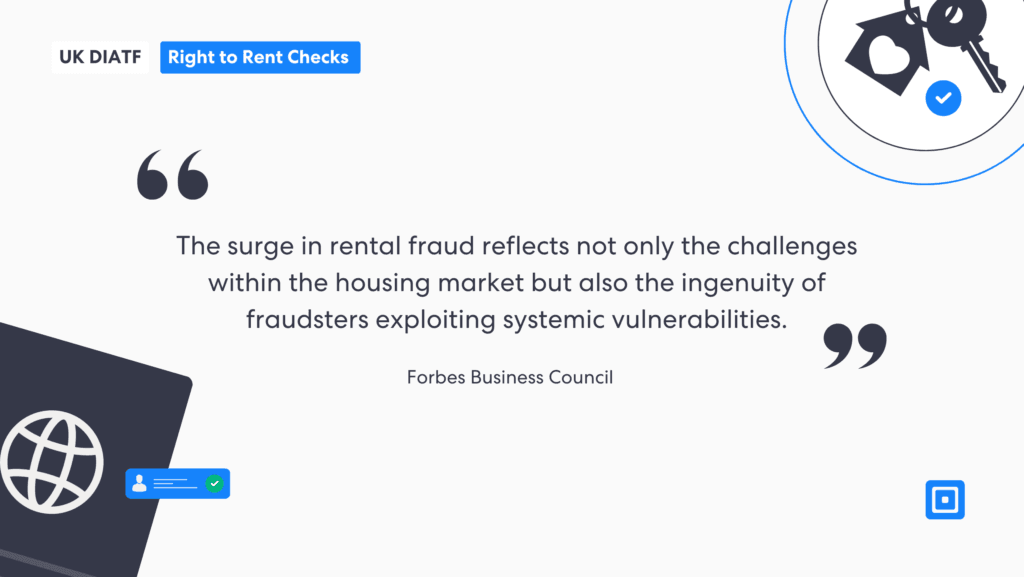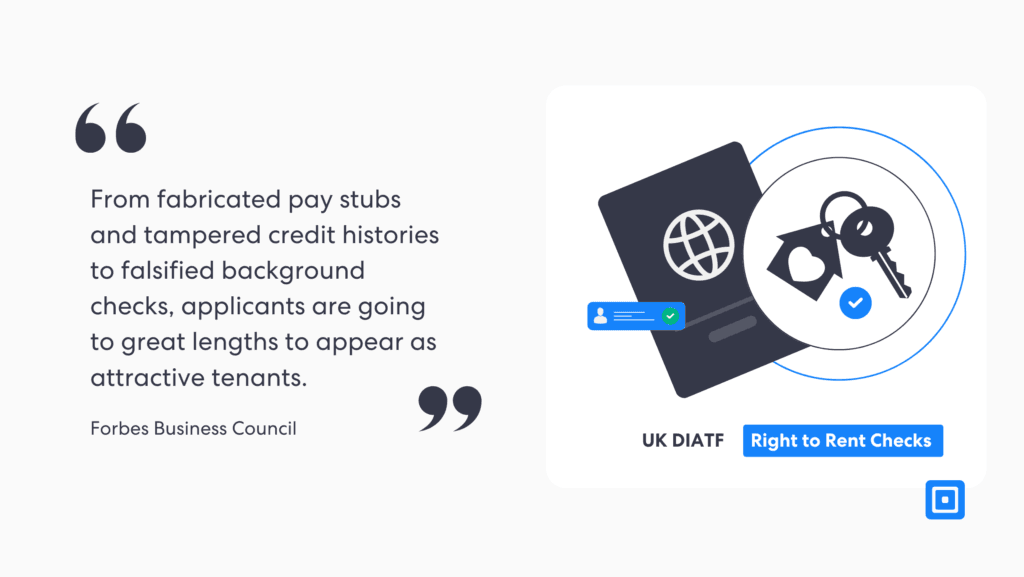With rental accommodation in short supply across the UK, landlords have experienced increasing difficulty with fraudulent tenancy applications. Faking jobs or hiding criminal records are just a couple of examples of common fraudulent practices. Screening and verifying tenants should always include comprehensive Right to Rent checks carried out by a UK government DIATF-certified Digital Identity Service Provider (IDSP).
Tenancy fraud has quadrupled over the past couple of years in the UK as spoofed documents have become increasingly sophisticated with AI tools. Letting agents should ensure tenants have the right immigration status and a legal right to rent property in the United Kingdom by partnering with a certified IDSP that can ensure presented documents are legitimate. Prospective tenants cannot be verified without undergoing a sophisticated document and biometric check to ensure not just the legitimacy of documentation but also that the identity presented is not fraudulent.
The surge in rental fraud reflects not only the challenges within the housing market but also the ingenuity of fraudsters exploiting systemic vulnerabilities.
Currently, British and Irish citizens must prove their legal right to rent within the country by just showing an identity document, such as a British passport. However, with cases of tenancy fraud on the rise, landlords are left vulnerable to a long list of possible threats without sufficient checks, such as non-payment of rent, legal issues, property damage, and more.
Tenancy Fraud in the UK and Ireland
Landlords in the UK are held accountable for allowing renters to live in a property without a legal right. Shelter England, a well-known UK housing and homelessness charity, states, “the landlord might face civil or criminal penalties if they let to someone without a right to rent or allow them to remain after their right to rent has expired.” With the recent surge of fraudulent practices within the UK rental market, such as a reported increase in council homes being illegally sub-let, landlords and rental agencies must act to protect themselves.

Tom Entwistle, a recognized writer in the UK on the subject of residential and commercial property, wrote in early 2024 that there has been a “four-fold increase in fraudulent tenancy applications over the past two years, which included doctoring bank statements exaggerating income, faking jobs and job references, and hidden criminal records.”
From fabricated pay stubs and tampered credit histories to falsified background checks, applicants are going to great lengths to appear as attractive tenants.
However, the sudden increase in rental fraud is not limited to just the UK. Forbes reported in August that the US’s National Apartment Association (AA) and National Multifamily Housing Council (NMHC) survey showed that nearly 94% percent of residential property operators reported that they had experienced rental fraud in the past year.
Rental Risks Involved
Right-to-rent checks exist to protect landlords. Without them, landlords face several risks. A lack of transparency around credit history, financial stability, criminal activities, and more can leave landlords vulnerable to the following consequences:
Non-payment of Rent: Unverified tenants may have poor credit histories or insufficient financial stability. This increases the risk of the landlord not being paid adequately or in a timely manner.
Property Damage: Without sufficient identity verification and, therefore, accountability for the individual, there’s no guarantee that the tenant will respect the property, leading to significant damage that could be costly to repair.
Legal Issues: The landlord may be vulnerable to penalties if a tenant is involved in illegal activities (e.g., drug production or dealing) within the rental property.
Eviction Difficulties: Evicting a problematic tenant can be costly and time-consuming, especially if they are not properly vetted before signing a lease. Legal proceedings for eviction can take months.
Increased Turnover Costs: Problematic tenants cause issues like wanting to vacate the property early, increasing turnover costs. Turnover costs might include paying for repairs, having the property cleaned, and advertising for new tenants.
Fraud and Identity Theft: An unverified tenant could use false or stolen identity documents to secure a lease, making it difficult to track them down if they cause issues.
Landlords can mitigate these risks by conducting thorough tenant screenings, including credit checks, background checks, income verification, and references.

The UK Government’s DIATF Initiative
The UK Government’s Digital Identity and Attributes Trust Framework (DIATF) aims to modernize Identity Verification practices by introducing reusable certified IDs as an alternative to traditional documents such as passports. To establish trust, the scheme sets new standards for Digital Identity Service Providers (IDSPs). To mitigate the risk of fraud, the UK DIATF published standardized confidence levels that IDSPs must meet to be certified Right to Rent check providers.
ComplyCube is a leading UK DIATF-certified IDSP. All of their products are independently government-certified, allowing for tailored solutions, including bespoke Right to Rent checks.
Implement a Right to Rent check with ComplyCube
Choosing a certified IDSP is key when implementing a robust Right to Rent check. ComplyCube’s platform leads the UK market with state-of-the-art solutions that can protect landlords and rental agencies across the country.
Tenant Document Authentication
Tenant documents can be efficiently verified using ComplyCube’s AI-powered document verification engine. Their checks include advanced cryptographic validation, such as scanning RFID chips via Near-Field Communication (NFC), confirming passport authenticity with Optical Character Recognition (OCR) and Machine Readable Zone (MRZ) analysis, and conducting forensic, structural, and consistency reviews to ensure accuracy and legitimacy.
AI-Powered Biometrics
ComplyCube is certified at PAD Level 2 for advanced liveness detection and facial recognition technology. Their tools offer high-precision facial similarity and liveness scores, combined with anti-spoofing image analysis, to accurately detect fraudulent attempts. Using 3D face mapping, the ComplyCube platform can recognize individuals even if they attempt to re-enroll with altered or false information.
UK Identity Fraud Check
The UK Identity Fraud Check leverages the SIRA network, the UK’s largest cross-sector database for customer risk intelligence, drawing data from over 170 institutions. In addition, ComplyCube’s additional access to Amber Hill and the Disclosure of Death Registration Information (DDRI) allows for the swift detection of sophisticated synthetic fraud.
For more information on implementing a Right to Rent check, contact ComplyCube’s expert compliance team.



